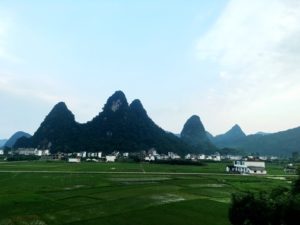Ecotourism Industry in China: Underdeveloped but with High Potential
Ecotourism Industry in China. Many of the negative impacts from tourism occur when a number of visitors are higher than the environment’s ability to cope with the volume of visitors. The tourism industry in China continues to grow and is accounting for a significant portion of the national economy. However, the ecotourism in China still has a long way before it can call itself a complete ecotourism. The lack of regulation enforcement and education complicates the development. However, with its vast reserves, China has a high potential for ecotourism.
Ecotourism Industry in China: a Popular Travel Destination
After opening the country to the rest of the world, China has become one of the most popular travel destination in the world. The UNWTO World Tourism Rankings rank China as the third most visited country in the world. In 2015, China draws in a crowd of 55.6 million international visitors staying overnight on the mainland. These visitors are mostly coming to China for sightseeing and leisure activities. Travel domestically is also promoted by the Chinese government. As such, Chinese travels 1.9 billion times yearly, of which 33 million visits were to Chinese nature reserves.
China as the New Ecotourism Destination
 Ecotourism has seen the rise of the tide for the past few years. As concerns for the environment grow, more and more people are turning their attention toward ecotourism. ‘Ecotourism’ believes that when traveling, one should not only minimize their carbon footprint and harmful environmental effect to the places they travel to but also contribute positively. Many companies offer such experiences to travelers who are interested. Shanti Travel is one of the many companies that offer ecotourism in India, Burma, Nepal and other countries in Asia. It might be difficult to many to imagine China as the new ecotourism destination, especially with its infamous Beijing smog and pollution problems. However, the trend is catching up to China and we might see a significant change in the tourism industry for the next couple of years. The Chinese Ministry of Environmental Protection or the MEP stated that there are 2,541 nature reserves covering 147 million hectares or 14.7% of China. 80% of these reserves have some form of ecotourism. With its rich natural landscape and features, China has beautiful natural scenery tourists are thirsty for. However, unlike ecotourism elsewhere, ecotourism in China tends to be larger in groups as they are used to tour groups style. Health benefits such as clean air are also heavily advertised as part of the ecotourism to lure in more Chinese travelers who hope to escape from the air pollution of the city. In addition, Chinese travelers tend to value man-made structures as equally as the natural scenery itself, which are often not the case in western travelers.
Ecotourism has seen the rise of the tide for the past few years. As concerns for the environment grow, more and more people are turning their attention toward ecotourism. ‘Ecotourism’ believes that when traveling, one should not only minimize their carbon footprint and harmful environmental effect to the places they travel to but also contribute positively. Many companies offer such experiences to travelers who are interested. Shanti Travel is one of the many companies that offer ecotourism in India, Burma, Nepal and other countries in Asia. It might be difficult to many to imagine China as the new ecotourism destination, especially with its infamous Beijing smog and pollution problems. However, the trend is catching up to China and we might see a significant change in the tourism industry for the next couple of years. The Chinese Ministry of Environmental Protection or the MEP stated that there are 2,541 nature reserves covering 147 million hectares or 14.7% of China. 80% of these reserves have some form of ecotourism. With its rich natural landscape and features, China has beautiful natural scenery tourists are thirsty for. However, unlike ecotourism elsewhere, ecotourism in China tends to be larger in groups as they are used to tour groups style. Health benefits such as clean air are also heavily advertised as part of the ecotourism to lure in more Chinese travelers who hope to escape from the air pollution of the city. In addition, Chinese travelers tend to value man-made structures as equally as the natural scenery itself, which are often not the case in western travelers.
Lack in Environmental Regulation and Education
 The MEP states that nature reserves should be divided into three zones: a core area, buffer area, and experimental zone. Tourism is only allowed in the experimental zone and not in the core area and buffer area. It is also prohibited in areas that are not divided. However, unfortunately, such regulations are not always enforced. Indeed, tourism has started to develop in the Ordos Relict Gull Reserve (ORGR) in Inner Mongolia on 2000. Despite the fact that ORGR is not divided, therefore, should not have any tourism in it, tourism continued developing. In fact, in 2003, the reserve saw 260,000 visitors in June alone. As a result of tourism development in the reserve, the number of Ordos Relict Gull nest dropped from 3,594 in 1998 to 0 in 2004. Not only that, bare land in the reserve also significantly expanded and water and soil quality deteriorated. The disaster in the Ordos Relict Gull Reserve is one of the many examples how the lack of environmental regulation enforcement can severely have affected the reserves they wish to protect. In addition, the lack of environmental education also slowed down the development of ecotourism in China. Many locals lack this knowledge and unknowingly caused harm to the environment in one way or another. As such, if China wishes to become the next ecotourism destination, it must focus on enforcing the existing environment regulations as well as educate locals who live around the different reserves. The government is already planning the future steps in order to preserve the natural environment of those reserves, both through campaigns and education.
The MEP states that nature reserves should be divided into three zones: a core area, buffer area, and experimental zone. Tourism is only allowed in the experimental zone and not in the core area and buffer area. It is also prohibited in areas that are not divided. However, unfortunately, such regulations are not always enforced. Indeed, tourism has started to develop in the Ordos Relict Gull Reserve (ORGR) in Inner Mongolia on 2000. Despite the fact that ORGR is not divided, therefore, should not have any tourism in it, tourism continued developing. In fact, in 2003, the reserve saw 260,000 visitors in June alone. As a result of tourism development in the reserve, the number of Ordos Relict Gull nest dropped from 3,594 in 1998 to 0 in 2004. Not only that, bare land in the reserve also significantly expanded and water and soil quality deteriorated. The disaster in the Ordos Relict Gull Reserve is one of the many examples how the lack of environmental regulation enforcement can severely have affected the reserves they wish to protect. In addition, the lack of environmental education also slowed down the development of ecotourism in China. Many locals lack this knowledge and unknowingly caused harm to the environment in one way or another. As such, if China wishes to become the next ecotourism destination, it must focus on enforcing the existing environment regulations as well as educate locals who live around the different reserves. The government is already planning the future steps in order to preserve the natural environment of those reserves, both through campaigns and education.
How does Daxue help its client?
The tourism industry in China is having a vast transformation with numerous advanced technologies, generating more and more demand patterns. This new reality is forcing businesses in the industry to adapt and review their business models. Daxue has helped one of its clients within the Ecotourism industry, identifying profit opportunities by taking advantage of the dynamics of the tourism industry’s changing market. Daxue Consulting has provided a business plan including the description of the business, the marketing strategy, the financial structure, and management. Daxue Consulting has conducted 5 in-depth interviews with ecotourism business owners in China, as well as the competitor’s benchmark to supplement its desk research. Daxue Consulting has used several methodologies in order to build this specific business plan, such as Online Survey, Focus Groups, and Market Analysis. The report provided to the client has helped him understand the industry in the Chinese market before launching its services in China. Follow us on our Social Media! Chinese Travellers | Daxue Consulting
To know more about the Ecotourism industry in China, contact us at dx@daxueconsulting.com





![[Interview] How to reach on high-end tourism market in China?](../wp-content/uploads/2017/09/Main-visual-1-150x150.png)









